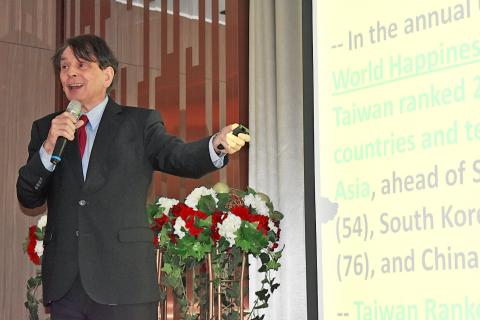The US government should forgo all references to “one China” in the context of Taiwan-related issues and policies, because the term is imprecise and misleading as Taiwan was never part of China, former American Institute in Taiwan (AIT) director William Stanton said yesterday.
Stanton, who headed the AIT’s Taipei office from 2009 to 2012, made the appeal during a speech on Taiwan-China policy in the US at a Taichung luncheon, which was organized by the Tai-Yang Cultural and Educational Foundation.
Taiwan was never part of China and the use of “one China,” which has always meant something different to Washington and Beijing, is inaccurate, misleading and confusing, Stanton said, adding that Washington should no longer say that it has a “one China” policy, as “that does not mean anything anymore.”

Photo: Chang Jui-chen, Taipei Times
The US government should also refrain from mentioning the Three Joint Communiques “as if they were the Bible,” Stanton said.
The first communique had the facts wrong and the third was effectively repudiated by the “six assurances” given to Taiwan by then-US president Ronald Reagan in 1982, he said.
Another problem is that Beijing and Washington have interpreted the first communique differently, Stanton added.
“They [the Chinese] use a different verb to say we acknowledge the Chinese position and they say cheng ren [承認, “agree with”], which has different meanings,” he said, referring to a section in the first part of the 1982 US-China joint communique that says that the US “acknowledged the Chinese position that there is but one China and Taiwan is part of China.”
Washington should initiate, but not necessarily advertise, exchanges of high-level officials between Taiwan and the US as called for in the Taiwan Travel Act, which was signed into law by US President Donald Trump in March, Stanton said.
However, Taiwan should carefully weigh the potential risk of such visits, he said.
Stanton was wary about a potential visit by President Tsai Ing-wen (蔡英文) to Washington, which some seem to be bandying about lately, including Joseph Bosco, former China country director in the office of the US secretary of defense, in an opinion piece on Monday last week in the political newspaper The Hill.
“If we are going to provoke China, it should be [for something] of lasting importance to Taiwan. I think that is the view of many people,” Stanton said, adding that Tsai should decide how much she would like to push for such a visit.
Asked on Tuesday last week to comment on Bosco’s piece, the Ministry of Foreign Affairs denied that Tsai planned to visit Washington, but did not elaborate.

Taiwan would welcome the return of Honduras as a diplomatic ally if its next president decides to make such a move, Minister of Foreign Affairs Lin Chia-lung (林佳龍) said yesterday. “Of course, we would welcome Honduras if they want to restore diplomatic ties with Taiwan after their elections,” Lin said at a meeting of the legislature’s Foreign Affairs and National Defense Committee, when asked to comment on statements made by two of the three Honduran presidential candidates during the presidential campaign in the Central American country. Taiwan is paying close attention to the region as a whole in the wake of a

President William Lai (賴清德) has appointed former vice president Chen Chien-jen (陳建仁) to attend the late Pope Francis’ funeral at the Vatican City on Saturday on his behalf, the Ministry of Foreign Affairs said today. The Holy See announced Francis’ funeral would take place on Saturday at 10am in St Peter’s Square. The ministry expressed condolences over Francis’ passing and said that Chen would represent Taiwan at the funeral and offer condolences in person. Taiwan and the Vatican have a long-standing and close diplomatic relationship, the ministry said. Both sides agreed to have Chen represent Taiwan at the funeral, given his Catholic identity and

Chinese Nationalist Party (KMT) Chairman Eric Chu (朱立倫), spokeswoman Yang Chih-yu (楊智伃) and Legislator Hsieh Lung-chieh (謝龍介) would be summoned by police for questioning for leading an illegal assembly on Thursday evening last week, Minister of the Interior Liu Shyh-fang (劉世芳) said today. The three KMT officials led an assembly outside the Taipei City Prosecutors’ Office, a restricted area where public assembly is not allowed, protesting the questioning of several KMT staff and searches of KMT headquarters and offices in a recall petition forgery case. Chu, Yang and Hsieh are all suspected of contravening the Assembly and Parade Act (集會遊行法) by holding

Lawmakers from the Democratic Progressive Party (DPP) yesterday established a friendship group with their counterparts in Ukraine to promote parliamentary exchanges between the two countries. A ceremony in Taipei for the Taiwan-Ukraine Parliamentary Friendship Association, initiated by DPP Legislator Chen Kuan-ting (陳冠廷), was attended by lawmakers and officials, including Deputy Minister of Foreign Affairs Francois Wu (吳志中) and European Economic and Trade Office in Taiwan Director Lutz Gullner. The increasingly dire situation in Ukraine is a global concern, and Taiwan cannot turn its back when the latter is in need of help, as the two countries share many common values and interests,